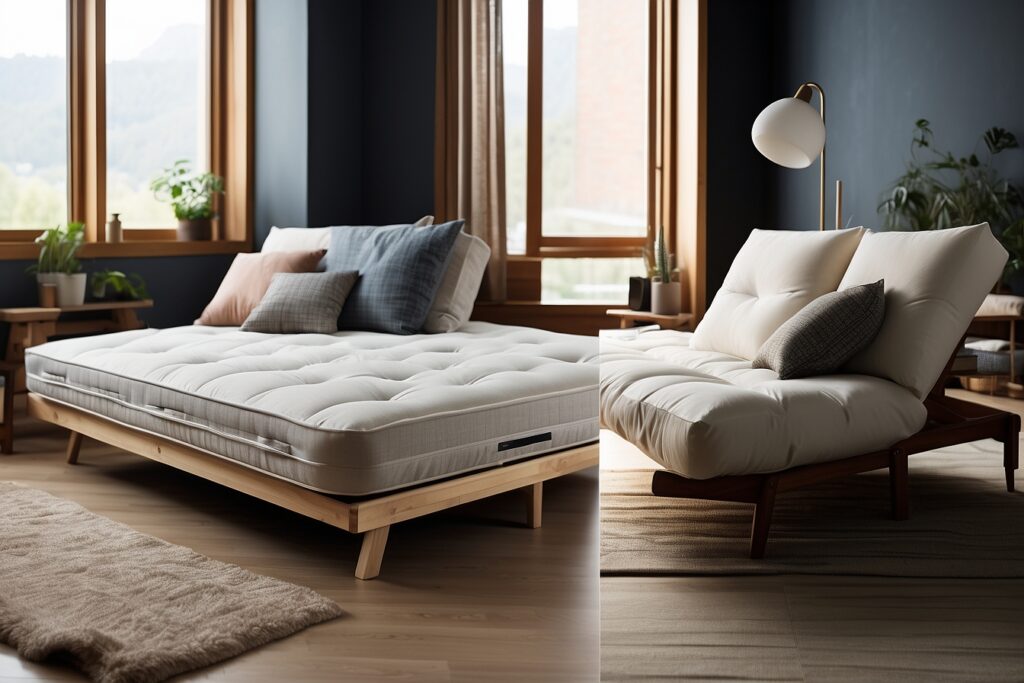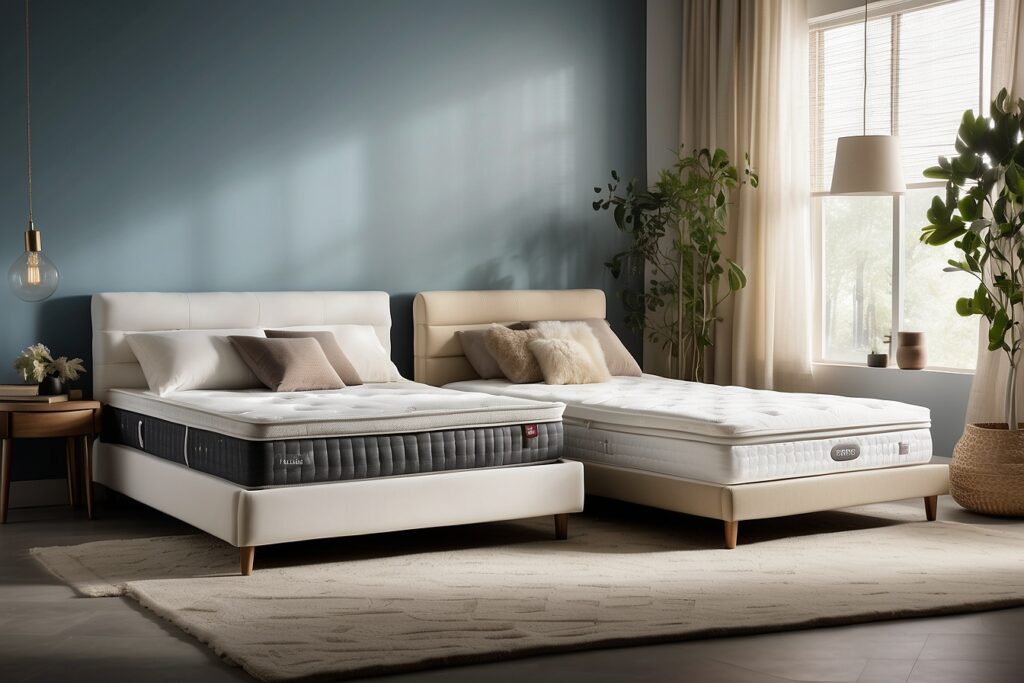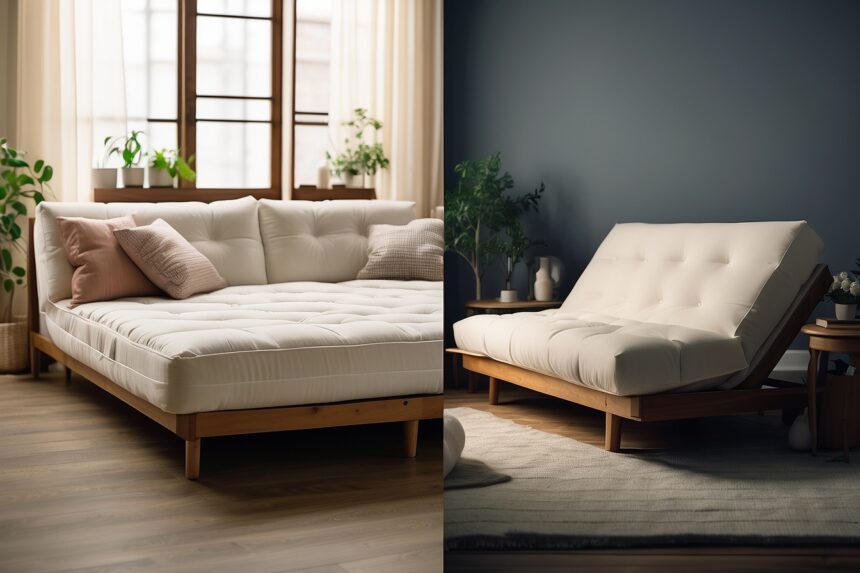In the quest for the perfect night’s sleep, the choice between a futon and a mattress often arises. The decision is not just about comfort; it encompasses factors like durability, price, versatility, and personal needs. Is a futon better than a mattress, or is it the other way around? This article aims to provide a comprehensive guide to help you make an informed choice.
Factors to Consider When Choosing Between a Futon and a Mattress

Comfort: Sink or Support?
When comparing futons and mattresses, the first thing that comes to mind is comfort. Futons are known for their pliability; they are softer and more conforming. They often appeal to those who prefer sinking into their bed. Mattresses, on the other hand, offer a range of options from plush to firm, making them suitable for various preferences.
Futon mattresses come in different types, such as innerspring, foam, and buckwheat. In contrast, traditional mattresses offer options like innerspring, memory foam, and latex. The choice here depends on your preference – do you desire a more plush, conforming surface, or do you need the support of a firm mattress?
Durability: Longevity Matters
Durability is a crucial factor when deciding between a futon and a mattress. Futons, while comfortable, are not as durable as mattresses. It may be necessary to change them more regularly. The lifespan of a futon or mattress can be affected by factors like weight capacity and how often it’s used.
In terms of materials and construction, traditional mattresses tend to be more robust. They are built to withstand nightly use and typically last longer. So, if you’re looking for a long-term investment in your sleep comfort, a mattress might be the better choice.
Price: Balancing Your Budget
For many, the price is a major determining factor in their choice between a futon and a mattress. Futons are generally more budget-friendly than traditional mattresses. This makes them an attractive option for those who need a comfortable sleep solution without breaking the bank.
The price of futons and mattresses can vary depending on factors like size, materials, and construction. Bargain hunters can find good deals on both options, but futons tend to be kinder to your wallet initially.
Versatility: Bed or Couch?
Futons have a unique advantage when it comes to versatility. They can serve a dual purpose as both a bed and a couch. This makes them an excellent choice for small spaces or rooms that need to multitask. Futon frames come in various styles, such as bi-fold, tri-fold, and click-clack, allowing you to transform your futon from a couch to a bed with ease.
Traditional mattresses, however, are primarily designed for sleeping. While they can be used on various bed frames, they lack the adaptability of futons.
Personal Needs: Tailoring to You
Ultimately, your choice between a futon and a mattress will be influenced by your individual needs and preferences. Your sleep position, body type, and budget all play a role in determining the ideal sleep solution for you.
For example, if you’re a side sleeper looking for a plush surface that cradles your body, a futon might be your best bet. However, if you suffer from back pain and need firm support, a quality mattress is likely a better choice.
Comparing Futons and Mattresses

Comfort: The Futon Experience
Let’s delve deeper into the comfort offered by futons. Futon mattresses are known for their adaptability. They conform to the shape of your body, providing a cozy, embracing feeling. They are perfect for people who prefer a softer, more cushioned sleeping surface. Futon mattresses come in various types, each catering to different preferences:
- Innerspring Futon Mattresses: These are similar to traditional innerspring mattresses, offering good support and a comfortable surface.
- Foam Futon Mattresses: Foam futon mattresses contour to your body, relieving pressure points and providing a cozy night’s sleep.
- Buckwheat Futon Mattresses: These are filled with natural buckwheat hulls, offering firm support and excellent breathability.
Comfort: The Mattress Experience
On the other hand, traditional mattresses offer a wide range of comfort options. They come in various types, including:
- Innerspring Mattresses: These are the most common type, featuring steel coils for support. The comfort level varies depending on the coil gauge and padding.
- Memory Foam Mattresses: Memory foam mattresses conform to your body’s shape, providing pressure relief and reducing motion transfer.
- Latex Mattresses: Latex mattresses are renowned for being responsive and long-lasting.
Durability: The Futon vs. Mattress Battle
In terms of durability, mattresses have a clear edge over futons. Traditional mattresses are designed to withstand daily use and can last for a decade or more. They come with warranties, often ranging from 10 to 25 years, which speaks to their longevity.
Futons, on the other hand, tend to have a shorter lifespan. The durability of a futon can vary depending on the materials used, the construction, and how frequently it’s used. However, it’s common to replace a futon every few years, which can be less cost-effective in the long run.
Price: Futon and Mattress Costs
The price can be a significant deciding factor for many when choosing between a futon and a mattress. Futons generally have a lower upfront cost, making them an attractive option for those on a tight budget.
The cost of futons and mattresses varies widely based on factors such as size, materials, and construction. High-end mattresses with advanced features can be quite expensive, while you can find budget-friendly futons that are comfortable and functional.
Versatility: The Futon’s Unique Selling Point
One of the unique features of futons is their versatility. They are dual-purpose furniture, serving as both a bed and a couch. This makes them a great choice for guest rooms, studio apartments, or any space where flexibility is essential. Futon frames come in various styles, each offering different advantages:
- Bi-Fold Futon Frames: These frames fold in half to transform the futon from a couch to a bed. They are easy to use and space-saving.
- Tri-Fold Futon Frames: Tri-fold frames offer more versatility in positioning, allowing you to adjust the futon for sitting, lounging, or sleeping.
- Click-Clack Futon Frames: These frames allow for easy adjustment with a simple click-clack mechanism. They are well-known for being simple to use.
Personal Needs: Finding the Right Fit
To make an informed decision between a futon and a mattress, consider your personal needs and preferences:
- Sleep Position: If you’re a side sleeper who craves softness, a futon might be a great choice. Those who sleep on their backs or stomachs may prefer the support of a mattress.
- Body Type: Heavier individuals may benefit from the support and durability of a mattress, while lighter individuals may find the conforming properties of a futon more comfortable.
- Budget: If you’re on a tight budget, a futon might be a practical choice. However, investing in a quality mattress can be a long-term solution that pays off in the form of better sleep.
Real-Life Experience
To gain a deeper understanding of the choice between a futon and a mattress, let’s delve into a real-life experience. I had the opportunity to try both a futon and a mattress, and my journey may shed light on the decision-making process.
My Choice
As someone who values versatility and space-saving solutions, I initially opted for a futon. I lived in a compact studio apartment and appreciated the ability to convert my futon from a comfortable couch during the day to a cozy bed at night. It seemed like the ideal solution for my living space.
Pros and Cons
My experience with the futon was a mixed bag. The futon was indeed comfortable, and the adaptability of being both a bed and a couch was highly convenient. It also didn’t break the bank, which was a significant plus.
However, over time, I noticed a few downsides. The futon’s durability left much to be desired. With frequent use, it began to show signs of wear and sagging. This affected both its comfort and appearance. Additionally, as a side sleeper, I found that the softness of the futon, while comfortable at first, didn’t provide the support I needed for a restful night’s sleep.
My experience with a mattress came when I decided to invest in a quality queen-sized memory foam mattress. The change was remarkable. The mattress offered excellent support, relieving my back pain and providing a deeper, more restful sleep. I was also impressed by its longevity; it showed no signs of wear even after several years of use.
However, I did miss the versatility of the futon. While the mattress was excellent for sleeping, it couldn’t double as a couch, which was occasionally inconvenient in my small living space.
Recommendation
Based on my experience, I would recommend a futon for those who have limited space and need a budget-friendly solution. It’s ideal for guest rooms, studio apartments, or college dorms. However, be prepared for the trade-off in terms of durability and long-term comfort, especially if you’re a side sleeper or require substantial support.
For those who can make the investment and prioritize sleep quality, a mattress is the way to go. The longevity, support, and comfort it offers make it a worthwhile choice. You can always complement it with other seating options in your living space.
Conclusion
In the debate of “is futon better than mattress,” there is no one-size-fits-all answer. Both futons and mattresses have their merits and drawbacks, and the ultimate choice depends on your unique needs and preferences.
Futons offer versatility, affordability, and immediate comfort, making them an attractive option for smaller spaces and tighter budgets. However, their durability may leave something to be desired, and they may not offer the support some sleepers require.
On the other hand, mattresses excel in durability, long-term comfort, and support, making them a fantastic choice for those who prioritize sleep quality and have a bit more room in their budget. However, they may lack the versatility of a futon.
The decision between a futon and a mattress is highly personal, and it’s essential to consider your sleep position, body type, and budget. Based on my own experience, I’d recommend a futon for those who need a budget-friendly, versatile solution but can accept the trade-offs. If you can invest in your sleep comfort and prioritize long-term support and durability, a quality mattress is the way to go.
Ultimately, the choice is yours. So, which do you think is better: a futon or a mattress? Post your ideas and experiences in the comments section below. Your unique perspective may help others in their quest for the perfect night’s sleep.







